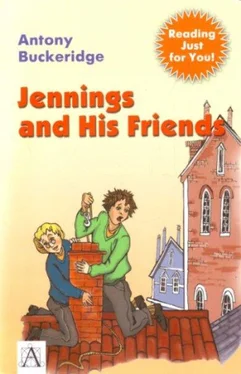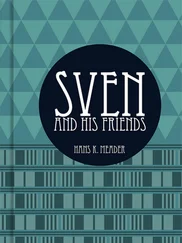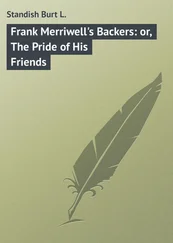Antony Buckeridge - Jennings and His Friends
Здесь есть возможность читать онлайн «Antony Buckeridge - Jennings and His Friends» весь текст электронной книги совершенно бесплатно (целиком полную версию без сокращений). В некоторых случаях можно слушать аудио, скачать через торрент в формате fb2 и присутствует краткое содержание. Жанр: Детская образовательная литература, на английском языке. Описание произведения, (предисловие) а так же отзывы посетителей доступны на портале библиотеки ЛибКат.
- Название:Jennings and His Friends
- Автор:
- Жанр:
- Год:неизвестен
- ISBN:нет данных
- Рейтинг книги:1.67 / 5. Голосов: 3
-
Избранное:Добавить в избранное
- Отзывы:
-
Ваша оценка:
- 40
- 1
- 2
- 3
- 4
- 5
Jennings and His Friends: краткое содержание, описание и аннотация
Предлагаем к чтению аннотацию, описание, краткое содержание или предисловие (зависит от того, что написал сам автор книги «Jennings and His Friends»). Если вы не нашли необходимую информацию о книге — напишите в комментариях, мы постараемся отыскать её.
Jennings and His Friends — читать онлайн бесплатно полную книгу (весь текст) целиком
Ниже представлен текст книги, разбитый по страницам. Система сохранения места последней прочитанной страницы, позволяет с удобством читать онлайн бесплатно книгу «Jennings and His Friends», без необходимости каждый раз заново искать на чём Вы остановились. Поставьте закладку, и сможете в любой момент перейти на страницу, на которой закончили чтение.
Интервал:
Закладка:
Jennings and Darbishire had other plans. But before they went out of the school yard they heard footsteps behind hem. They turned round and saw Venables. In his hand he carried his Grimshaw's Latin Grammar.
"Wait a minute," he said. "Are you going to Dunhambury?"
"Ssh! Don't speak so loudly!" said Jennings. "If Mr Carter knows that we are going so far there will be... I don't know what there will be."
"It's about these Latin books," Venables said in a whisper. "Mine is a first edition too. So I wondered if you could take it with you."
"I don't advise you to sell yours," said Darbishire. "Jennings is selling his because he has to buy you a big cake."
"But I want to sell mine, too. Please, Jennings, take it," said Venables.
Jennings thought for a moment. If he could sell one book, he could sell two books at the same time.
"All right," he said.
"Thank you very much," smiled Venables. "But, please, buy a newer edition before you sell the old book. The Headmaster will be very angry if I haven't got a book for his class on Monday."
Jennings and Darbishire hurried to the bus stop. They had very little time. It was a long way to Dunhambury, and they had to be back at school by half past four.
For a quarter of an hour they waited at the bus stop. At last a bus came, and soon they arrived at Dunhambury.
For some time they could not find a bookshop. They saw all kinds of shops, but not a bookshop.
"There must be a bookshop in the town," Darbishire said.
"But, maybe these people have no time to read books," said Jennings.
"Shall we ask?"
"Whether they are too busy to read?"
"No, you silly! Shall we ask where a bookshop is?"
"Better not. Nobody must know that the pupils of Linbury Court Boarding School have come here to sell rare and valuable books, because..." Jennings stopped and looked at his friend. "Why do you still have your school cap on, Darbi?"
"I'm sorry," said Darbishire. He took off his school cap and put it in his pocket.
At last they saw a bookshop. There were a lot of old books in the shop window but it was so dusty that the boys could not read the titles of the books. In front of the shop there was a long table with many books in it.
"It's very risky to leave these books out in the street," Darbishire said, "if they are valuable first editions."
Jennings took a dust thick book from the table. "Poems by Alfred Tennyson," he read. "This book must cost a lot," he said. "It's very thick."
"A hundred pounds?" asked Darbishire.
Jennings looked at the price. "No, nine pence. Maybe it's only a second edition. Let's go in, shall we!"
It was a dark little shop, and for a moment the boys thought it was empty: because Mr Barlow, the bookseller, looked like his books. His clothes were as dusty as the books on his shelves and he looked at the boys through spectacles which were as dusty as his window.
"Well?" he asked the boys. "What can I do for you?"
"Jennings handed him the two books that he carried.
"How much do these books cost?" he asked.
Mr Barlow took of his spectacles.
"Hm. Grimshaw's First Latin Grammar. Ah, yes, a very good book." He turned over some pages. When Mr Barlow began to turn the pages of the book Jennings closed his eyes. The pages were not very clean and all the pages were not there.
"A very good book," repeated Mr Barlow. "Very good condition. Beautiful binding."
"Oh, do you think so?" exclaimed Jennings. He turned to Darbishire. "Do you hear that, Darbi?" Then he turned back to the counter. "How much does it cost, please?"
Mr Barlow looked up at the ceiling.
"Let's say five shillings each," he said.
"Oh! Is that all?" exclaimed Jennings. That was much less than a hundred pound.
"You will not buy them for less than that," said the bookseller.
"Buy them! I don't want to buy them. I want to sell them," exclaimed Jennings.
"Didn't you take these books from that table near by shop?" asked Mr Barlow.
"Oh, no! We brought them with us. They are ours - they are!"
"How do I know that they are really yours? People often bring me in a book and I give them a good price for it, and all the time it's my own book that they have taken from the table outside."
"But they are really ours," repeated Jennings. "You must believe us."
There was something in Jennings' voice that made Mr Barlow believe the boys. He looked at the books again.
"These books aren't much good to me. The pages are not clean, and all the pages are not there."
"But a minute ago you said that the books were in a good condition."
"Oh, yes," said the bookseller, "but that was before I knew you wanted to sell them. Well, I'll give you three pence for each."
"Three pence!" exclaimed Jennings. He got very angry. "They cost five shillings each a minute ago when you thought we wanted to buy them."
Mr Barlow put on his spectacles.
"That's business, my boy," he said. "These old books don't cost... Oh, wait a moment! I think somebody has ordered Grimshaw's Latin Grammar."
He opened his order book. "Yes, I thought so! The Headmaster of Linbury Court Boarding School asked me to sent him any copies which I had."
The bookseller took the two books and put three sixpence on the counter.
"I'm giving you nine pence for each! That is much more than they really cost."
"Just think," Jennings said to Darbishire in a whisper. "The Headmaster will have to pay five shillings for the book which he thinks is in my desk."
"We can't take a hundred pounds for it," answered Darbishire.
"What are you talking about?" asked Mr Barlow.
"I... I don't want to sell the books I want them back," said Darbishire.
Now Mr Barlow did not want to give them back.
"You will not get a better price for them," he said. "Well, I'll give you one shilling and nine for the two of them. All right?"
"No, thank you very much. They are not for sale," said Jennings.
"Not for sale! What do you mean - not for sale? You've said you came here to sell them!" cried the bookseller.
"Yes, I know, but now quite suddenly I've decided not to sell them."
Mr Barlow put the books back on the counter.
"You are two silly boys who don't know whether you want to buy books or sell them," the bookseller said angrily. "Get out of my shop, and take your books with you!"
The boys were only too happy to go!
Chapter Thirteen
Jennings gives the prize
Jennings and Darbishire went into the street.
"Just think, Jen. The headmaster takes the Latin book and finds your name on the first page," said Darbishire and leaned on Mr Barlow's table. When he did it a pile of books fell from the table.
"You are so clumsy, Darbi!" Jennings said angrily. "Now look what you've done!"
"I'm sorry, Jen. It was that clumsy table..."
"Quick; pick them up before the old man comes out of his shop!"
The boys picked the books up and put them back on the table. The last book, which Jennings was just going to put back on the table was Poems by Alfred Tennyson. The book had opened when it had fallen down and Jennings took his handkerchief from his pocket to clean the dust from the two open pages.
"I think it's all right now, so we'll put it..." He stopped and looked in surprise at the page in front of him.
"What's the matter?" asked Darbishire.
"I don't know."
"Listen to this on page one hundred and thirty-four of Alfred Tennyson's poems:
'Break, break, break,
On thy cold grey stones, O Sea!
And I would that my tongue could utter
The thoughts that arise in me!'
"It's a nice poem, isn't it?" said Darbishire. "You know, Jen, I think I've heard that poem somewhere before."
"I'm sure you have heard it," cried Jennings. "And I know when and where."
Читать дальшеИнтервал:
Закладка:
Похожие книги на «Jennings and His Friends»
Представляем Вашему вниманию похожие книги на «Jennings and His Friends» списком для выбора. Мы отобрали схожую по названию и смыслу литературу в надежде предоставить читателям больше вариантов отыскать новые, интересные, ещё непрочитанные произведения.
Обсуждение, отзывы о книге «Jennings and His Friends» и просто собственные мнения читателей. Оставьте ваши комментарии, напишите, что Вы думаете о произведении, его смысле или главных героях. Укажите что конкретно понравилось, а что нет, и почему Вы так считаете.












